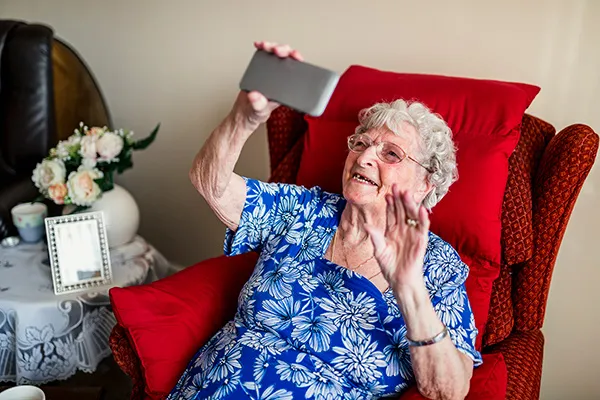Keeping up with doctor’s appointments is essential to managing health and staying informed, but it can often feel overwhelming. From scheduling and transportation to understanding medical advice and ensuring proper follow-up, there are many details to manage. This is where Understood Care can help. Our advocates serve as trusted guides, working alongside you or your loved one to make the process easier, more organized, and more comfortable.
Personalized Support Before and After Every Appointment
Understood Care advocates provide hands-on help with all aspects of medical visits. We help you schedule appointments, confirm provider information, and prepare for the visit itself. This might include reviewing your questions ahead of time, making sure prescriptions are current, or gathering any medical records needed. After the appointment, we help you understand the doctor’s recommendations and take the right steps to follow through on care instructions, referrals, or additional tests.
A Partner to Help You Understand Your Care
Medical visits can involve unfamiliar language, new diagnoses, or complex treatment plans. Your advocate is there to help translate this information into clear, understandable terms. We make sure you feel confident about what was discussed during the visit and that you know what actions to take next. If something is unclear or left unanswered, your advocate can follow up with your provider to get the information you need.
Coordination Across Your Care Team
Many people receive care from more than one doctor. Your advocate helps ensure that your care is well coordinated across primary care providers, specialists, and other professionals. We help share information between offices, keep records consistent, and make sure appointments align with your overall care goals. This reduces confusion and helps prevent important details from being overlooked.
Support for Getting to and From the Appointment
Transportation should never be the reason you miss a doctor’s visit. Your advocate helps you arrange reliable ways to get to and from appointments. Whether that means booking a ride service, coordinating with a caregiver, or finding community transportation resources, we make sure you have safe and timely access to care. We also consider mobility needs, language assistance, and other accessibility factors to support your comfort and safety.
Emotional and Practical Support Throughout
Doctor’s visits can bring up feelings of stress, uncertainty, or fatigue, especially when managing long-term conditions or complex health needs. Understood Care advocates are here to offer steady support throughout the experience. We are here to listen, provide encouragement, and help you make informed decisions without feeling overwhelmed.
Confidence in Every Step of the Journey
With Understood Care, you are never alone in managing your medical appointments. From the moment you schedule your visit to the follow-up that comes afterward, your advocate is there to help you stay organized, prepared, and empowered. We make it easier to stay connected to the care you need and to move forward with confidence.
Why this matters
Scammers target people every day by phone, text, email, and mail. Many pretend to be Medicare, a clinic, a charity, or a trusted company. Others try to sell false coverage, bill for services you never received, or push free tests that your doctor did not order. Knowing the signs helps you act early, protect your information, and stop losses before they start. The Federal Trade Commission, the Centers for Medicare and Medicaid Services, and the Office of Inspector General share clear warning signs and reporting steps.
Common healthcare scams to watch for
Government and business impersonation
You get a call, text, or email that looks like it is from Medicare, Social Security, the FTC, a hospital, a pharmacy, or a known company. The message claims an urgent problem or prize and pressures you to act fast. It demands payment by gift card, cryptocurrency, wire, or a payment app. Real government agencies and reputable companies do not ask for payment that way. Hang up. Do not click links. Go directly to the official site or the phone number on your card to verify. Report what happened to ReportFraud.ftc.gov.
Grandkid and family emergency stories
A caller pretends to be a grandchild or relative in trouble and begs for secrecy and fast payment. Stop and verify with another family member or by calling the person back using a number you already have.
Health insurance and Marketplace scams
Ads and callers may offer cheap plans, free gift cards, or say they are from HealthCare.gov. Some enroll people in plans without permission or switch plans behind their back. Get coverage information only from HealthCare.gov or the Marketplace Call Center. Never share personal data with unsolicited sellers. If you have Medicare, it is against the law for anyone to sell you a Marketplace plan.
Medicare genetic testing and free equipment scams
Fraudsters offer free genetic tests, cancer screens, or durable medical equipment at health fairs, by phone, or door to door, then bill Medicare when no doctor ordered the item. Do not share your Medicare number. Only your own clinician should order tests or equipment for you. Report suspected fraud to the OIG Hotline or Medicare.
Unwanted calls and texts
Scammers ignore the National Do Not Call Registry and use spoofing to fake caller ID. Your best defense is call blocking, call labeling, and refusing to answer unknown numbers. Register your number and report unwanted calls.
Medical billing and collection scams
Some bad actors send fake bills, pressure you to pay by unusual methods, or misstate what insurance allowed. Always compare every bill to your Explanation of Benefits or your Medicare Summary Notice. If you see services you did not receive, call the provider and your plan, then report suspected fraud.

Fast safety checks before you respond
- Pause and talk to someone you trust or your advocate. Scammers rely on secrecy and urgency
- Never pay with gift cards, cryptocurrency, or wire for any bill or plan
- Do not click links or open attachments from unknown senders
- Verify directly with your clinic, pharmacy, plan, or government site using a phone number you already have
- Review your Medicare Summary Notices and plan statements and keep a simple care calendar to match dates and services
- Register your number with the National Do Not Call Registry and turn on call blocking on your phone
How an advocate helps you avoid scams
- Screen suspicious messages with you
Send questionable emails, texts, letters, and voicemails to your advocate. We help check sender details, look up official contacts, and decide next steps so you do not respond to a fake request - Verify benefits and bills
We compare your bills and statements with your visit notes and your Medicare Summary Notices, then call the provider or plan with you to correct mistakes or challenge improper charges - Coordinate with your care team
We contact your doctor or pharmacy directly to confirm whether a test, device, or refill is real and necessary - Report and document
We walk you through reporting to ReportFraud.ftc.gov, the HHS OIG Hotline, Medicare, the FBI Internet Crime Complaint Center, and your state if needed. We help keep copies, dates, and case numbers for your records - Set up practical protections
We help you register for the National Do Not Call Registry, adjust phone settings, and use call blocking. We can also help you place alerts or freezes with credit bureaus if identity theft is suspected
Explore related Understood Care support
Care coordination https://understoodcare.com/care-types/care-coordination
Lower costs of medication https://understoodcare.com/care-types/lower-costs-of-medication
Appointments and visit support https://understoodcare.com/care-types/appointments
Financial help https://understoodcare.com/advocates
Why advocates matter https://understoodcare.com/advocates

What to do right now if something seems off
- Stop contact with the caller, texter, or email sender
- Save evidence screenshots, emails, phone numbers, and dates
- Call your plan or Medicare using the number on your card and ask for a benefits check
- Report
ReportFraud.ftc.gov for any consumer scam
HHS OIG Hotline for Medicare related fraud
1 800 MEDICARE for billing issues or suspected abuse
IC3.gov for internet enabled fraud and elder fraud concerns ReportFraud.ftc.govOffice of Inspector GeneralMedicareInternet Crime Complaint Center - Tell someone you trust and consider asking an advocate to help you follow through on every step
How Understood Care works with you
You are not alone. An advocate can join calls, help file reports, and keep follow up tasks organized so you feel supported and protected. We can also help you learn simple habits that reduce risk, like confirming requests through official phone numbers, keeping a care calendar, and reviewing your Medicare Summary Notices every month. Start a conversation with an advocate today at https://understoodcare.com or call (646) 904-4027

FAQ
- Why is it important to learn about healthcare scams?
Scammers target people every day by phone, text, email, and mail, often pretending to be Medicare, a clinic, a charity, or a trusted company. They may try to steal your information, bill for services you never received, or push “free” tests and equipment that your doctor did not order. Knowing the warning signs helps you act early, protect your identity, and stop losses before they start. - What are government and business impersonation scams?
In these scams, a caller, texter, or email claims to be from Medicare, Social Security, the FTC, a hospital, pharmacy, or familiar company. They create a fake emergency or special offer, then pressure you to act fast and pay with gift cards, cryptocurrency, wire transfer, or a payment app. Real government agencies and reputable companies do not demand payment this way. The safest response is to hang up, avoid clicking links, and contact the real organization using the phone number on your card or their official website. - What is the “grandkid” or family emergency scam?
A scammer pretends to be a grandchild or relative in trouble, often claiming they have been arrested or hurt and need money right away. They usually beg you not to tell anyone. This is a big red flag. Always pause and verify by calling the relative directly using a number you already have or checking with another trusted family member before sending any money. - How do health insurance and Marketplace scams work?
Some ads, calls, or messages offer cheap health plans, free gift cards, or claim they are from HealthCare.gov. They may sign people up for plans without permission or switch their coverage behind their back. You should only use HealthCare.gov or the official Marketplace Call Center for Affordable Care Act coverage information. Never give personal information to unsolicited sellers. If you have Medicare, it is illegal for anyone to sell you a Marketplace plan. - What are Medicare genetic testing and “free equipment” scams?
Fraudsters often offer free genetic tests, cancer screenings, braces, or other durable medical equipment at health fairs, over the phone, or door to door. They may ask for your Medicare number and then bill Medicare for services your doctor never ordered. Only your own clinician should order tests or medical equipment for you. If you are offered something “free” in exchange for your Medicare number, that is a warning sign to walk away and report it. - How can I protect myself from unwanted calls and texts?
Scammers ignore the National Do Not Call Registry and use spoofing to make caller ID look local or familiar. Your best defense is to avoid answering unknown numbers, use call blocking or call labeling, and hang up if something feels wrong. You can register your number with the National Do Not Call Registry and report unwanted calls, but remember that scammers may still try to reach you, so staying cautious is essential. - How do medical billing and collection scams show up?
Sometimes you may receive a bill for services you never had, or a collector may pressure you to pay quickly using unusual methods. Always compare every bill to your Explanation of Benefits or your Medicare Summary Notice. If you see services you do not recognize, call the provider and your plan to review the charges. If you suspect fraud, report it to Medicare or the appropriate agency. - What quick safety checks should I do before responding to any message or call?
Pause and talk to someone you trust or your advocate, because scammers rely on secrecy and urgency. Never pay with gift cards, cryptocurrency, or wire transfer for medical bills or insurance. Avoid clicking links or opening attachments from unknown senders. Verify directly with your clinic, pharmacy, plan, or government office using a phone number you already have. Review your Medicare Summary Notices regularly and keep a simple calendar of your visits so you can match dates and services. - How can an advocate help me avoid scams and handle suspicious messages?
An advocate can review suspicious texts, emails, letters, and voicemails with you, check sender details, and look up official contact information to decide whether something is real. They can compare your bills and plan statements with your visit history, call providers and insurers with you, and help you correct or challenge improper charges. Advocates also coordinate with your doctors and pharmacies to confirm whether a test, device, or refill is legitimate. - What help can I get with reporting scams and setting up protections?
If something looks wrong, an advocate can walk you through reporting to sites such as ReportFraud.ftc.gov, the HHS Office of Inspector General Hotline, Medicare, or the FBI Internet Crime Complaint Center when needed. They help you keep records of dates, case numbers, and responses. They can also assist you with registering your phone on the National Do Not Call Registry, turning on call blocking, and placing alerts or freezes with credit bureaus if identity theft is suspected. - What should I do right away if I think I am being scammed?
You should stop all contact with the caller, texter, or email sender and save any evidence such as screenshots, emails, phone numbers, and dates. Then call your plan or Medicare using the number on your card and ask them to review your benefits and any recent charges. Report what happened to the appropriate agencies and tell someone you trust, such as a family member or advocate, so they can help you follow through. - How does Understood Care support me in staying safe from scams?
Understood Care advocates can join calls with you, help file reports, and track follow up steps so you are not dealing with this alone. They teach simple habits that reduce risk, such as confirming requests using official phone numbers, maintaining a care calendar, and reviewing your Medicare Summary Notices every month. You can start a conversation with an advocate online or by calling the number provided, and together you can build a plan to stay protected. -
References
- https://consumer.ftc.gov/scams
- https://consumer.ftc.gov/features/how-stop-unwanted-calls
- https://www.donotcall.gov
- https://consumer.ftc.gov/articles/how-avoid-government-impersonation-scam
- https://consumer.ftc.gov/features/pass-it-on/impersonator-scams/grandkid-scams
- https://consumer.ftc.gov/features/pass-it-on/health-insurance-scams
- https://consumer.ftc.gov/articles/spot-health-insurance-scams
- https://reportfraud.ftc.gov
- https://www.medicare.gov/basics/reporting-medicare-fraud-and-abuse
- https://www.medicare.gov/publications/10111-protecting-yourself-from-fraud.pdf
- https://oig.hhs.gov/fraud/report-fraud
- https://oig.hhs.gov/fraud/consumer-alerts/fraud-alert-genetic-testing-scam
- https://oig.hhs.gov/newsroom/videos/genetic-testing-fraud-alert
- https://www.ic3.gov
- https://www.fcc.gov/consumers/guides/stop-unwanted-robocalls-and-texts
- https://www.healthcare.gov/protect-from-fraud-and-scams
- https://www.cms.gov/marketplace/outreach-and-education/protect-yourself-from-fraud-in-ealth-insurance-marketplace.pdf
- https://www.ftc.gov/business-guidance/blog/2024/04/new-ftc-data-spotlight-offers-illuminating-insights-impersonation-scams
This content is educational and is not a substitute for medical advice. Always consult your healthcare provider for personalized care.
Want a patient advocate by your side?
Quick & EasyMeet a supporting physician today for your 20-minute intake session.
Personal SupportAt Understood Care, you're seen, heard, and cared for.






